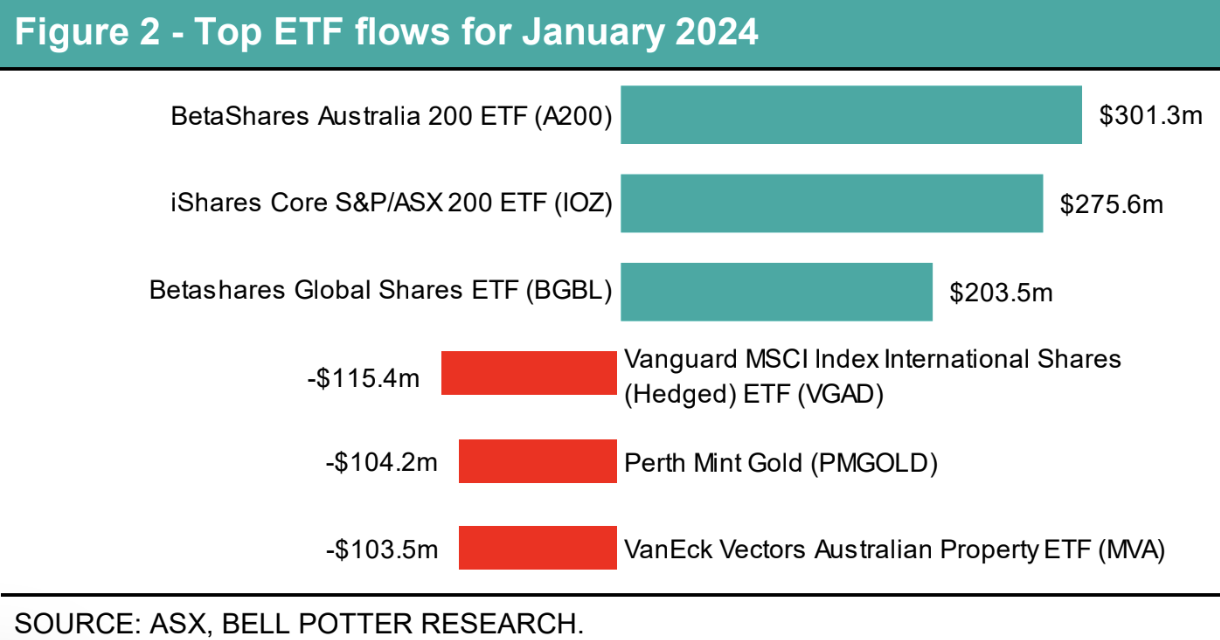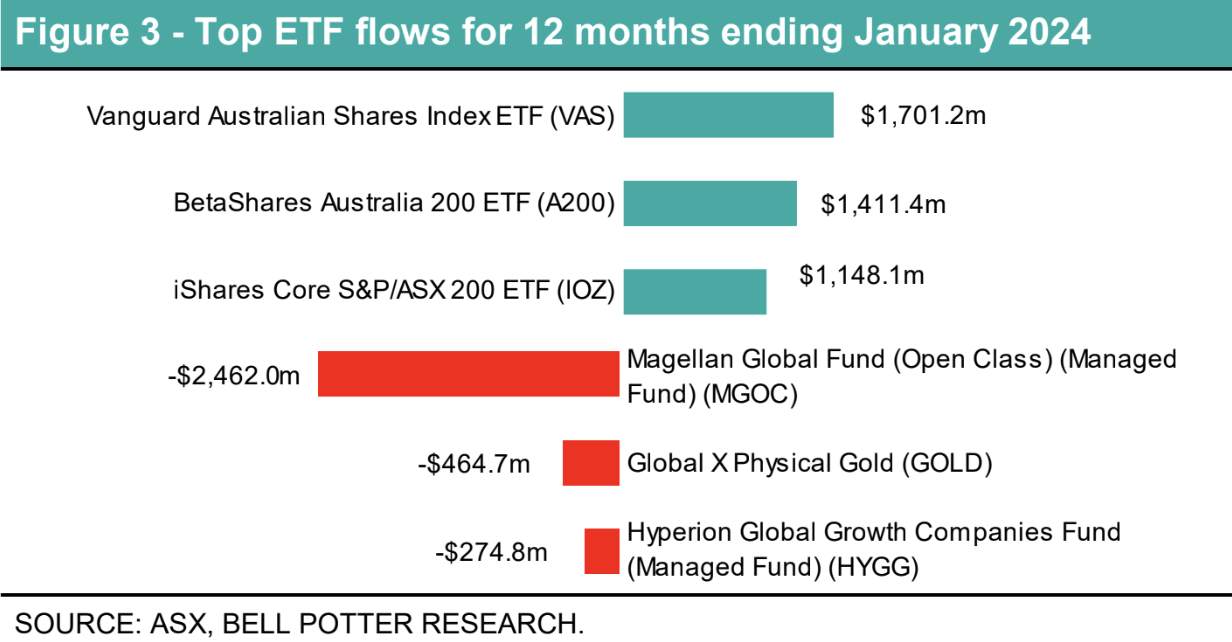These are the 14 most widely-owned ETFs in Australia
The numbers are undeniable - investors are making a conscious switch from actively managed funds into exchange-traded products.
But which investors are buying which products? While people of all ages love the ease of index ETFs (and why wouldn't they when Warren Buffett, of all people, recommends buying the S&P 500), the differences between thematics vary by age and even where you live!
In this wire, I draw on the insights of the ASX, Stake, and Selfwealth to identify which exchange-traded products (ETPs) are resonating with different generations of investors.
Who owns what?
To start with, let's take a look at the five most widely-owned ETFs, based on the ASX's most recent data. The analysis is gleaned by finding the five largest ETFs by funds under management - and shows that although ETFs are often thought of as the primary avenue to access global equities, three of the top five ETFs track some variant of the Australian stock market.
| Code | Product Name | FUM ($ million) |
| ASX: VAS | Vanguard Australian Shares Index ETF |
14,584.16 |
| ASX: VGS | Vanguard MSCI Index International Shares ETF |
6,936.44 |
| ASX: IVV | iShares S&P 500 ETF |
6,929.53 |
| ASX: IOZ | iShares Core S&P/ASX 200 ETF |
5,122.88 |
| ASX: STW | SPDR S&P/ASX 200 | 4,987.77 |
Now, let's take a look at the ETFs that had the most inflows and outflows last month.

And now, the ETFs that have had the most inflows and outflows in the 12 months to the end of January 2024.

Stake users' favourite ETFs, by age group (Data as of December 2023)
| Position | 18-30 | 31-45 | 46-60 | 60+ |
| 1 |
Vanguard Australian Shares Index ETF (ASX: VAS) |
Vanguard Australian Shares Index ETF (ASX: VAS) |
Vanguard Australian Shares Index ETF (ASX: VAS) |
Vanguard Australian Shares Index ETF (ASX: VAS) |
| 2 | Vanguard MSCI Index International Shares ETF (ASX: VGS) |
iShares S&P 500 ETF (ASX: IVV) |
Betashares Nasdaq 100 ETF (ASX: NDQ) |
Betashares Nasdaq 100 ETF (ASX: NDQ) |
| 3 |
iShares S&P 500 ETF (ASX: IVV) |
Vanguard MSCI Index International Shares ETF (ASX: VGS) |
iShares S&P 500 ETF (ASX: IVV) |
iShares S&P 500 ETF (ASX: IVV) |
| 4 |
Betashares Nasdaq 100 ETF (ASX: NDQ) |
Betashares Nasdaq 100 ETF (ASX: NDQ) |
Vanguard MSCI Index International Shares ETF (ASX: VGS) |
BetaShares ASX 200 ETF (ASX: A200) |
| 5 |
Vanguard Diversified High Growth ETF (ASX: VDHG) |
Vanguard Diversified High Growth ETF (VDHG) |
Vanguard Australian Shares High Yield ETF (ASX: VHY) |
BetaShares Australian Equities Strong Bear Hedge Fund (ASX: BBOZ) |
"Investors tend to favour straightforward index tracking products of major markets," says Megan Stals, Stake Market Analyst.
"VAS and VGS are a sensible combination that could provide exposure to most of the developed world’s stock markets. Although around 70% of VGS’s assets are listed in the US," she adds.
What's interesting about this list is that Stake users don't tend to use smart beta or sector-specific strategies in the same way that other investors might do. Income-centric ETFs are also used as an "add-on" to a core portfolio given these products have higher fees.
And while it's young people who have grasped the ETF trend with both hands, it may surprise you to know that young investors are buying ETFs with a more values-based approach in mind.
"The investment patterns of younger investors reveal a group interested in long-term wealth creation through a selection of broad-market, low-fee ETFs. This group is the only one where a values-based investing approach appears to have taken hold," Stals says.
Meanwhile, it's older customers that are actually chasing higher-performing industries and buying geared products.
"The 46-60 age group is even more likely to chase higher performing industries, notably those related to technology, with Betashares Global Cybersecurity ETF (ASX: HACK) and Global X Fang+ ETF (ASX: FANG) emerging as top picks in 2023, and the BetaShares Crypto Innovators ETF (ASX: CRYP) becoming popular in 2024. Although by this time in life, they are likely to already have built up the core of their portfolio in broad market ETFs and could be more comfortable with taking risks due to experience," she adds.
Selfwealth users' favourite ETFs, by age group
| Position | Gen Z (18-27 years old) | Millennial (28-43) | Gen X (44-59) | Baby Boomers (60+) |
| 1 | Vanguard Diversified High Growth Index ETF (ASX: VDHG) | Vanguard Australian Shares Index ETF (ASX: VAS) | Vanguard Australian Shares Index ETF (ASX: VAS) | Vanguard Australian Shares Index ETF (ASX: VAS) |
| 2 | Vanguard Australian Shares Index ETF (ASX: VAS) | Vanguard MSCI Index International Shares ETF (ASX: VGS) | Vanguard MSCI Index International Shares ETF (ASX: VGS) | Vanguard MSCI Index International Shares ETF (ASX: VGS) |
| 3 | Vanguard MSCI Index International Shares ETF (ASX: VGS) | Vanguard Diversified High Growth Index ETF (ASX: VDHG) | Vanguard Diversified High Growth Index ETF (ASX: VDHG) | iShares S&P 500 ETF (ASX: IVV) |
| 4 | iShares S&P 500 ETF (ASX: IVV) | iShares S&P 500 ETF (ASX: IVV) | iShares S&P 500 ETF (ASX: IVV) |
Betashares NASDAQ 100 ETF (ASX: NDQ) |
| 5 | Betashares NASDAQ 100 ETF (ASX: NDQ) |
Vanguard US Total Market Share ETF (ASX: VTS) | Betashares NASDAQ 100 ETF (ASX: NDQ) | Betashares Australia 200 ETF (ASX: A200) |
By its CEO's own admission, Selfwealth's users (of which there are 130,000 active investors) are more "value-oriented". But that doesn't mean investors on that platform are not using ETFs - far from it.
"We've certainly seen an increase in investors looking to move into ETFs. They look at ETFs for a number of reasons - simplicity, transparency, cost-effectiveness, and the thematic exposure," Craig Keary, Selfwealth CEO told me. "They can then match that to their other investments," he added.
He added that it was "no surprise" that Betashares and Vanguard remain the two most popular providers.
The themes that are most popular between ages also reflect the investors who are in them.
"Gen X and Millennials tend to favour communications as a thematic. We know that Gen X, Millennials, and Z tend to favour consumables, industrials, technology, and energy while boomers tend to favour the financials and are incredibly keen on health care and real estate," Keary said.
Selfwealth's data also finds interesting trends among the home states of certain investors. For instance, investors who live in mining and resources-rich areas like Queensland, Western Australia, and the Northern Territory are more likely to pick resources and energy-thematic products for their portfolio.
4 topics
14 stocks mentioned
14 funds mentioned


